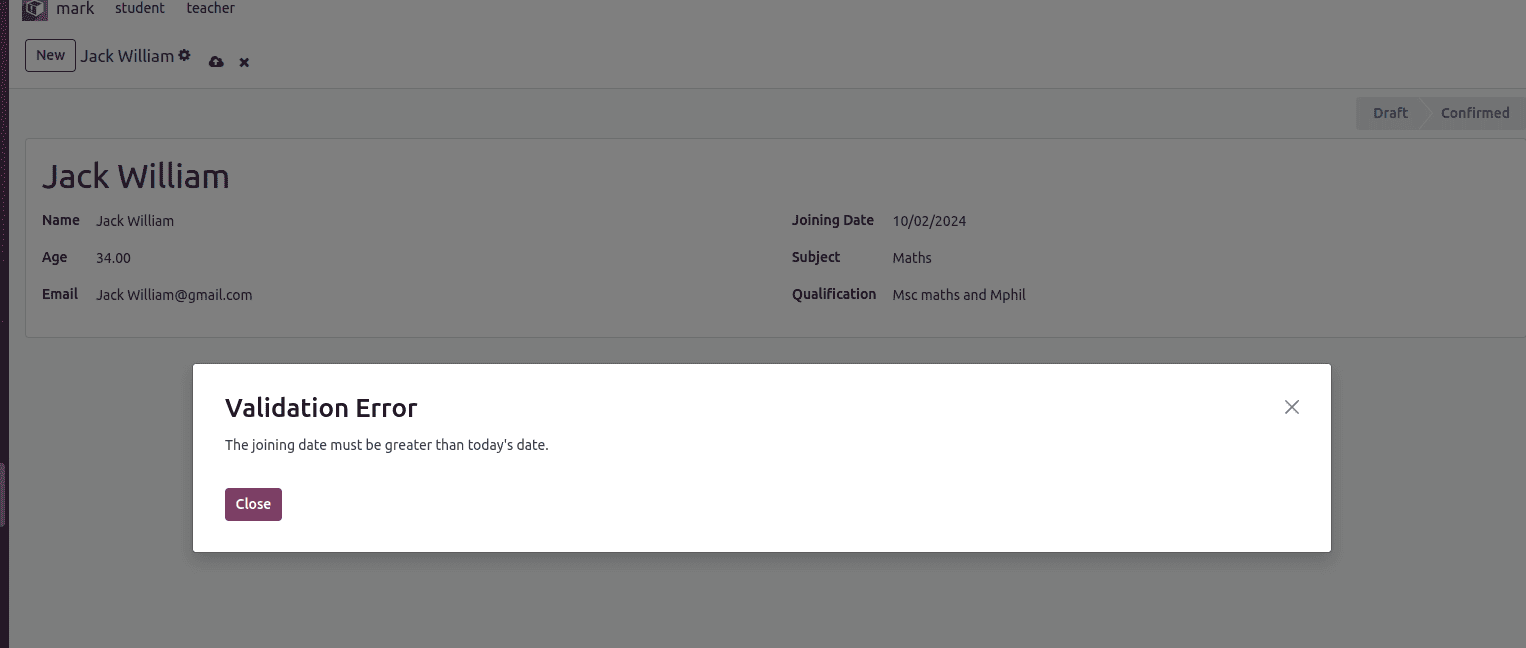In Odoo, constraints are essential conditions that ensure the validity of records by enforcing data integrity. They prevent the creation or modification of records that do not meet specific criteria. This helps avoid invalid or inconsistent states in the database, which could lead to data corruption or inaccurate reports.
For instance, constraints ensure that a start date is always before an end date in scheduling applications. They also ensure that certain fields, such as email addresses and product codes, contain unique values to prevent duplicates.
There are two main types of constraints in Odoo:
1. SQL Constraints
These are database-level constraints that ensure the integrity of data at the database level. They are defined using the model attributes _sql_constraints in the model. If a record violates a SQL constraint, an error will be raised when trying to save the record.
_sql_constraints = [(name, sql_def, message)]
* Name: A unique name for the constraint. This name is used to identify the constraint in error messages and debugging. It must be unique across all constraints in the model.
* Sql_def: A string defining the SQL constraint. This typically includes the SQL command to enforce the constraint. such as UNIQUE(column_name).
* Message: A user-friendly error message that will be displayed when a violation of the constraint occurs. This message should clearly indicate what the issue is, guiding users to correct their input.
For example, in our custom model, we can add as follows,
class ClassTeacher(models.Model):
_name = 'class.teacher'
_description = 'Class Teacher'
_sql_constraints = [('unique_email', 'UNIQUE(email)', 'Email
must be unique!'),]
This SQL definition specifies that the email column must have unique values. If any record attempts to save a duplicate email, the constraint will trigger an error message informing the user that the email they are trying to enter already exists in the database.

2. Python Constraints
Implemented using the @api.constrains decorator, these constraints enable the definition of more complex conditions based on the model's fields, which are validated upon record creation or update, raising an exception if the conditions are not met.
# -*- coding: utf-8 -*-
from odoo import api, fields, models, _
from odoo.exceptions import ValidationError
class ClassTeacher(models.Model):
_name = 'class.teacher'
_description = 'Class Teacher'
_sql_constraints = [
('unique_email', 'UNIQUE(email)', 'Email must be unique!')]
name = fields.Char(string='Name')
age = fields.Float(string='Age')
email = fields.Char(string='Email')
subject = fields.Char(string='Subject')
qualification = fields.Char(string='Qualification')
experience = fields.Float(string='Experience (Years)')
state = fields.Selection([('draft', 'Draft'),
('confirm', 'Confirmed')], string='State')
joining_date = fields.Date(string='Joining Date')
@api.constrains('joining_date')
def _check_joining_date(self):
for rec in self:
if rec.joining_date and rec.joining_date <
fields.Date.today():
raise ValidationError(
_("The joining date must be greater than today's
date."))
The @api.constrains decorator only supports simple fields, such as partner_id, and does not handle related fields, like partner_id.phone, as they are disregarded.
It results in error message when the conditions are met.

SQL constraints are more efficient as they operate at the database level. Python constraints allow for more complex logic and can use multiple fields to evaluate conditions.
Constraints in Odoo are rules that enforce data integrity by ensuring specific conditions are met when creating or updating records. They can be implemented using SQL constraints, which handle tasks such as enforcing uniqueness and maintaining referential integrity. For more complex validation logic, constraints can be implemented using Python. These mechanisms work together to ensure the consistency and reliability of data in the system.
To read more about Configuration of Python & SQL Constraints in Odoo 17, refer to our blog Configuration of Python & SQL Constraints in Odoo 17.